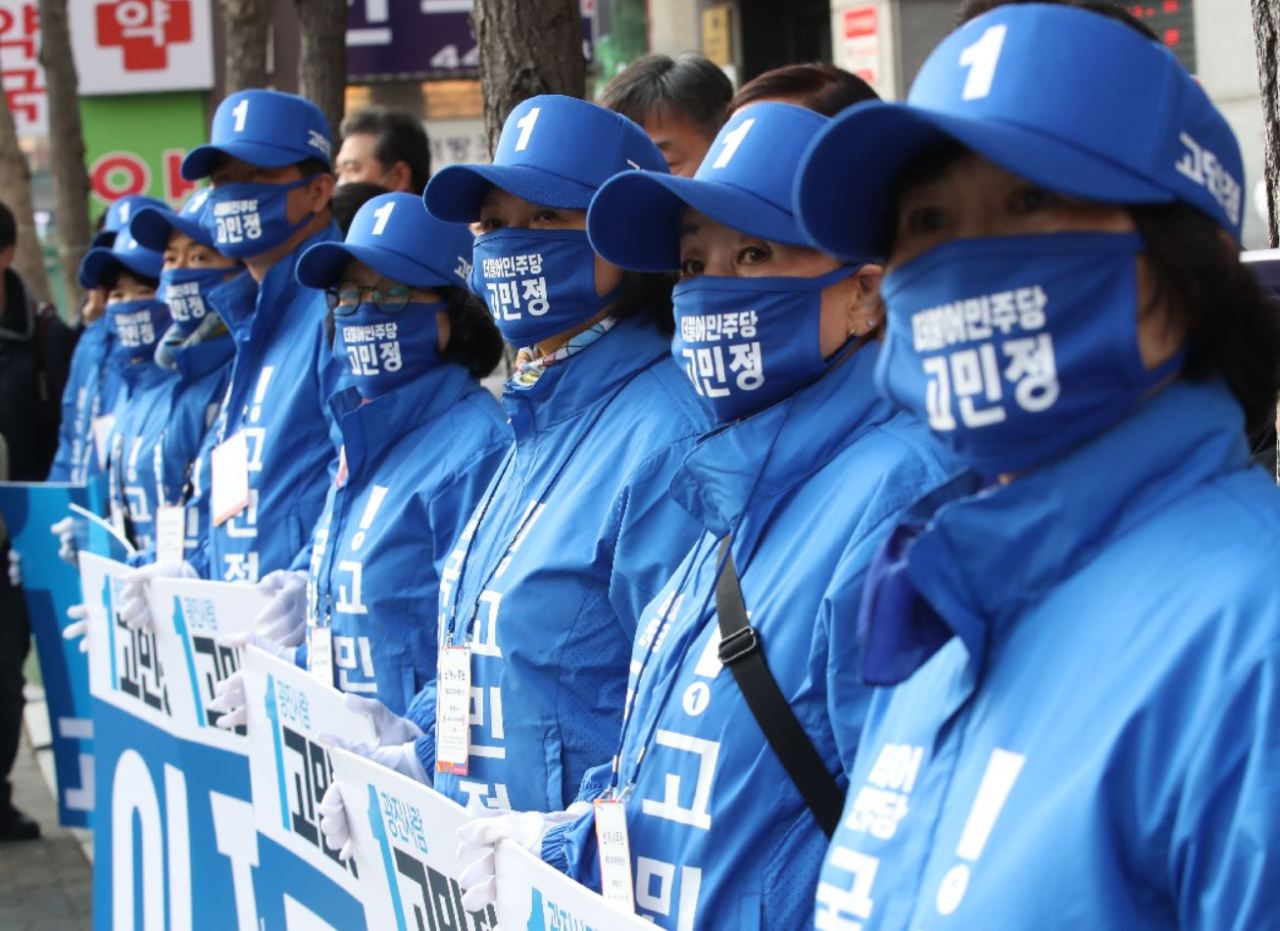How COVID-19 pandemic changed Korea’s election campaign
Virus outbreak sidelines major issues, boosts ruling party’s standing on campaign trail
By Ock Hyun-juPublished : April 15, 2020 - 20:23

Parliamentary elections in South Korea, which took place amid a global COVID-19 pandemic, turned out to be a referndum on the Moon Jae-in administration’s response to the virus.
The government’s handling of the coronavirus outbreak dominated campaign talk, with usually popular issues -- such as the approach toward North Korea, the slowing economy, prosecution and election reforms and corruption scandals -- nearly gone missing. And the marked slowdown in the virus’ spread in recent weeks aided President Moon and his party.
On the campaign trail, the ruling Democratic Party of Korea asked for voters’ support to win the coronavirus “war” while the opposition United Future Party struggled to shift attention toward the country’s sluggish economy and corruption scandals involving Moon’s aides.
As Korea saw spikes in new infections in February linked to a massive cluster in a church in Daegu, the opposition bloc sought to make a political gain out of it, bombarding the Moon administration with attacks on its “failure” to protect people, by not closing the border with China.
That strategy proved to be short-sighted.
As the virus situation here stabilized, winning much global praise, the public sentiment quickly turned favorably toward the Moon administration.
Even without resorting to draconian measures such as lockdowns, the number of new cases in Korea dropped to around 30 this week, falling off from the peak of 909 recorded on Feb. 29. Many see this as a result of health authorities’ rapid testing and extensive contract tracing, as well as citizens’ voluntary participation in social distancing campaign nationwide.
In the last week of February, some 50.7 percent of the respondents saw Moon’s running of state affairs negatively, 4.6 percentage points higher than those holding favorable views about him, according to a poll by Realmeter. Back then, the government was also facing criticism for a shortage of face masks.
Moon’s approval rating rose to 54.4 percent this week, marking the highest rating since November 2018, according to another poll by Realmeter, on the back of public support for the government’s response to the virus.
The rise in Moon’s approval rating also gave the ruling Democratic Party a boost.
In the poll by Realmeter released last week, 44.4 percent of respondents said the COVID-19 crisis would work in the ruling party’s favor, while 21 percent said it would help opposition parties.
In the poll, 46.3 percent of the respondents supported the Democratic Party, while 33.1 percent favored the United Future Party.
The virus changed the way parties campaigned, too.
With rigorous social distancing practice in place, Korea’s election campaigns, which are often festive with cheerful music and dancing, were kept mostly low-key.
Candidates were seen addressing crowds in masks and gloves, and trying to minimize their physical contact with voters by greeting constituents from a distance with first or elbow bumps instead of handshakes. Vans with loud speakers blaring theme songs and political chants were largely missing.
They, instead, moved online, using text messages and phone calls to appeal to voters who largely stayed home.
But COVID-19 also took away voting rights of half of some172,000 Koreans living overseas, as election-related operations at 91 diplomatic missions in 55 countries were shut down amid the pandemic across the globe.
By Ock Hyun-ju (laeticia.ock@heraldcorp.com)
-
Articles by Ock Hyun-ju



![[Herald Interview] 'Amid aging population, Korea to invite more young professionals from overseas'](http://res.heraldm.com/phpwas/restmb_idxmake.php?idx=644&simg=/content/image/2024/04/24/20240424050844_0.jpg&u=20240424200058)






![[Hello India] Hyundai Motor vows to boost 'clean mobility' in India](http://res.heraldm.com/phpwas/restmb_idxmake.php?idx=644&simg=/content/image/2024/04/25/20240425050672_0.jpg&u=)








